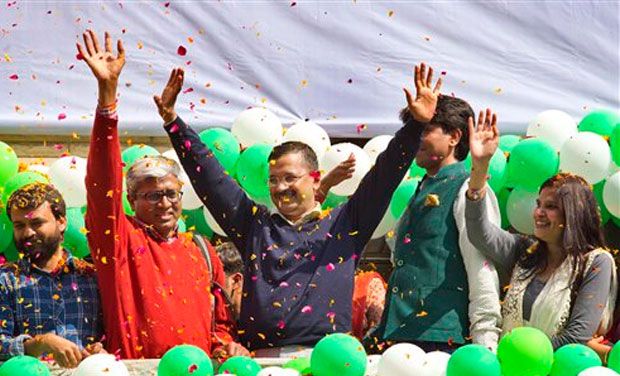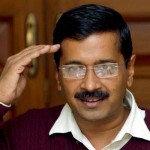New Delhi: Delhi has chosen the Aam Aadmi Party as its leader for the next five years with a historic and decisive mandate that its leader Arvind Kejriwal called “scary”.
More than an absolute majority was bequeathed on the anti-corruption crusaders and it seems all combinations came together to carry the party through to the Delhi Assembly.
Even exit polls were wrong! While they had unanimously spoken in favour of an AAP victory, they were way off the final figures. Even the most generous poll had not given AAP more than 50 seats in the 70-member House. But the AAP won 67 seats. That left the BJP very red faced with only three, and the Congress with no face at all – zero seats.
AAP leader Arvind Kejri’wall’ thanked the people for this “scary support”, held forth his “virtuous path” as the reason behind this mandate and said he would be “everybody’s CM”. He will take oath as Delhi chief minister on February 14.
Thought to be a close competitor, the BJP failed miserably to read the signs that were evident from the buzzing AAP poll booths on election day itself. Rattled by Kejriwal’s popularity, Modi headlined several major rallies, portraying his rival as a “backstabber” who betrayed voters last time round by quitting so early. But Kejriwal’s pledges to tackle entrenched corruption and lower utility bills won over legions of working-class voters willing to give him a second chance.
As soon as counting began to call the Delhi Assembly elections, AAP took a decisisve lead over its nearest political competitor and had shot out of orbit as the minutes progressed.
Very, very soon, the AAP was headed towards an absolute majority, something that had eluded it in the December 2013 elections.
BJP’s chief ministerial nominee Kiran Bedi lost from Krishna Nagar, a party safe seat. The wave was such that no seats were safe these elections for the BJP. Bedi thanked the BJP for its support and took full responsibility for the defeat.
Prime Minister Narendra Modi called Arvind Kejriwal to congratulate him and to say they would work together. Kejriwal said he was looking forward to meeting the Prime Minister. It is learnt Modi has invited the future Delhi chief minister for tea.
Celebrations predictably started early in AAP headquarters as early leads turned into a massive mandate. AAP leader Yogendra Yadav said: “It was just not the underclass, but the middle class also voted AAP.”
The battle to win control over the city has seen a resurgent Aam Aadmi Party (AAP) this time. While the BJP rode its ‘Modi juggernaut’, the AAP fell back on it rainbow base of the urban rich and the poor. With the Congress a complete pushover in recent elections, the minority vote also went to AAP. In fact, the Congress never looked it would even win one seat from the very beginning.
As the BJP ran for cover, its parting shot was: “This is not an anti-NDA wave. This was a referendum on Kejriwal. It is a positive vote for AAP, but not a negative vote for BJP.” Political pundits said the BJP now has the budget at the end of this month to raise its stocks among the voteratti. BJP spokesperson GVL Narsimha Rao said: “People felt AAP should be given another chance.”
Meanwhile, Andhra Pradesh Chief Minister N Chandrababu Naidu congratulated Aam Aadmi Party (AAP) leader Arvind Kejriwal for his party’s spectacular victory. The victory of AAP reflects the greatness of democracy in India, Naidu said in a statement.
The AAP wave first claimed Congress’ chief ministerial candidate and party general secretary Ajay Maken as Maken resigned from the post after his party’s woeful performance.
All exit polls had given AAP a decisive edge over the Bharatiya Janata Party, with one of them predicting the ‘jhadoo’ would get 53 seats in the 70-member House.
The BJP had rejected the exit polls and exuded confidence of wresting power in Delhi after a gap of 16 years. The party had said it would get 34 to 38 seats.
All eyes have been on AAP chief Arvind Kejriwal this time — his second shot at power in Delhi after he resigned as its chief minister on February 14, 2014 after just 49 days in office. Having defeated Congess’ Sheila Dikshit last time, Kejriwal headed a minority government but resigned in less than two months because of his inability to pass the proposed anti-corruption bill. He had blamed other parties for not supporting him. Kejriwal later apologised for quitting, and propped himself up in the general elections against Prime Minister Narendra Modi in Varanasi.
The BJP, which has been out of power in Delhi for the last 16 years, made a gamble by making former IPS officer Kiran Bedi their chief ministerial candidate which is said to have triggered discontent among the party leaders and ranks.


